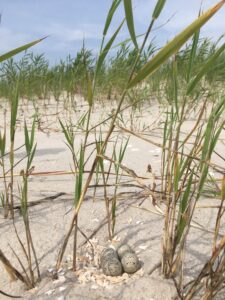Beach Nesting Birds Project
Ray Hennessy
Protecting some of New Jersey’s most at-risk wildlife
Piping plovers, least terns, and black skimmers, collectively referred to as beach nesting birds, are among New Jersey’s most at-risk wildlife species. All three species are listed as endangered in New Jersey and, in addition, the Atlantic Coast population of the piping plover is federally listed as threatened along its entire breeding range. Because they nest on beaches, which are teeming with people during peak breeding season in the spring and summer, these birds are especially vulnerable. It is highly unlikely they would survive in New Jersey without extensive protection.
CWF is actively involved in all phases of conservation for these beach nesting birds, as well as American oystercatchers, a state species of special concern that also nests on beaches and is subject to many of the same threats. Each year nesting areas are protected with fences and posted with signs to alert beachgoers where birds are nesting and to prevent nests and young chicks from being trampled or run over. Additionally, special cages called predator exclosures are sometimes placed over many piping plover nests to prevent predators from destroying their eggs. CWF deploys both paid seasonal staff and volunteers to assist our full-time biologists with these and other protection strategies. They also collect breeding data – on population trends, reproductive success, and threats – critical to tracking and aiding recovery.
Beach nesting birds in New Jersey are on the brink—help us turn the tide for these endangered coastal treasures!

Although we work all along the coast, our ongoing efforts at the Edwin B. Forsythe National Wildlife Refuge, which in recent years has hosted nearly half of the state’s piping plovers and some of its largest least tern colonies, is especially important. CWF helps monitor and manage Horseshoe Island, a new offshore island that is home to the state’s largest black skimmer colony, as well as large colonies of least terns, common terns, and royal terns. The site is also important for American oystercatchers and in 2024 became the state’s newest piping plover nesting area. CWF continues to expand its beach nesting bird programs; in 2023 we started an exciting new initiative to monitor American oystercatchers on the Delaware Bay to expand our knowledge of this lesser known breeding population.
Aside from our on-the-ground protection and monitoring, CWF works behind the scenes to develop beach management plans with coastal communities and landowners to minimize impacts on beach nesting birds from their beach management, maintenance, and use of the beach. These comprehensive plans provide an essential mechanism to guide consistent and effective long term protections. CWF is also involved in a number of habitat restoration and enhancement projects, such as our highly successful Barnegat Light Habitat Restoration Project, to benefit nesting shorebirds both now and in the future.
Although our primary efforts to help beach nesting birds are focused in New Jersey, we realize they only spend a portion of their life cycle here, so protections are needed at migratory sites and on their wintering grounds, as well. CWF has been actively involved with partners to aid conservation and research all across the flyway, most notably our work with the American Oystercatcher Working Group and a coalition of groups to study piping plovers wintering in the Bahamas. Indeed, forging conservation partnerships is the hallmark of CWF’s Beach Nesting Bird Project. We work closely with New Jersey Fish and Wildlife, U.S. Fish and Wildlife Service, U.S. Army Corps of Engineers, Rutgers, the State University of New Jersey, New Jersey Department of Military and Veteran Affairs, and The Wetlands Institute, to name a few of our most important partners, to advance recovery efforts.
Learn about the Barnegat Light Restoration Project and Horseshoe Island in the videos below.
Contact Us
Wildlife Biologist
Emmy Casper
emmy.casper@conservewildlifenj.org
Senior Wildlife Biologist
Todd Pover
609-306-4475 todd.pover@conservewildlifenj.org